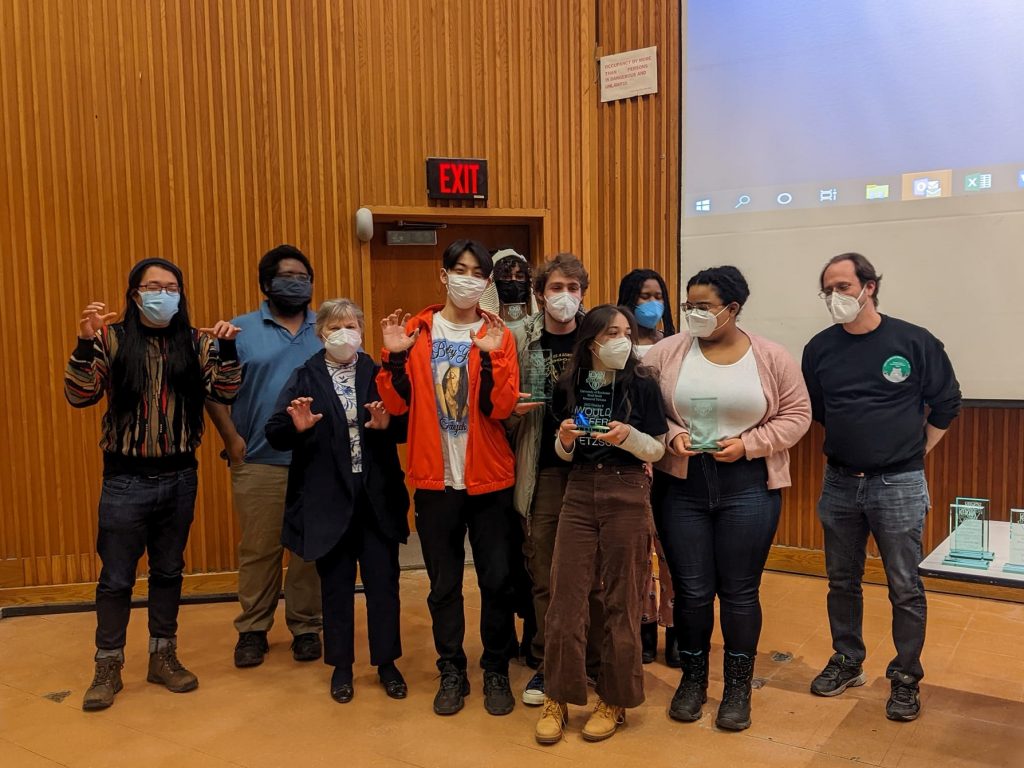The Binghamton University speech and debate team found historic success in their first fully in-person competition since 2020.
The speech and debate team traveled to the University of Rochester on Feb. 26 and Feb. 27 to compete in the H. Brad Smith Memorial Debate Tournament, where they emerged with two teams qualified for the National Debate Tournament (NDT), as well as having the top four best-ranked speakers in the entire tournament. These invitations come in addition to already qualifying for the Cross Examination Debate Association (CEDA) Nationals.
Joe Schatz, director of the speech and debate program and lecturer of English, described the difficulty and anticipation associated with the slow return to in-person tournaments.
“Continuing to watch tournaments cancel in-person competition for online models has been disheartening and has made it harder to retain new members,” Schatz wrote in an email. “It was very exciting to return to travel and in-person debates for the University of Rochester and the upcoming NDT and CEDA Nationals.”
Prior to the University of Rochester tournament, the majority of this season’s competitions have been hybrid. DavidMichael Woodward, the speech and debate team coach, said preparing for such events was a subject of focus during practice.
“The main thing that went into preparation was to get students ready for a more hybrid style of debate and getting back into in-person competitions,” Woodward wrote in an email. “This season has mostly been online, but as time has gone on, more and more tournaments have had a mix of online and offline entrants. Most of our events this year we’ve been online, but [for] the National Qualifier and the NDT and CEDA [Nationals] we will be competing in person, and given the delay since we’ve been able to have that opportunity, it will take getting used to, though the students and the staff are very excited about competing in person.”
For the team, virtual competitions had brought along different challenges. Sonnie Picallo, a sophomore majoring in philosophy, said the lack of activity during virtual tournaments was often burdensome.
“Keeping your body moving is important for debate,” Picallo wrote in an email. “It is hard to eat during tournaments because of how stressed you are, and it is harder when you aren’t actually moving your body and seeing people. Standing up and talking so fast for so long is physically exhausting! I am excited to walk around and explore different campuses in person and be more active and hopefully see the sun during tournaments.”
Eli Louis, an undeclared sophomore, said staying attentive used to be a challenge when competitions were held online.
“The biggest difference is the transference of energy and how engaged you can be,” Louis wrote in an email. “Oftentimes I find myself disassociating behind a screen hearing people speak so fast, whereas in person, it’s almost as if you’re more alert and in tune to what’s going on. And since my strategies are based upon more spoken word poetry/performance, you feel more connected with the energy in the space given the attention is on you and there’s just a rush that being in person provides.”
The H. Brad Smith Memorial Debate Tournament marked the first time in the speech and debate team’s history that it qualified for the NDT with the top seed in the district. According to Woodward, determination was the biggest factor that led to the achievement.
“I think the biggest thing for the team is their spirit and perseverance,” Woodward wrote. “Even though we had to battle a lot of illnesses in the fall semester, leading to results that left everyone unsatisfied, the reality was the debaters kept looking forward and had their goals of making it to nationals, and they were able to battle back to obtain the goals they wanted. I think this perseverance is a good example of what makes my students different than those from other universities, as they have shown themselves to be some of the most hardworking debaters I’ve had the pleasure to work with.”
Catherine Marin, the team’s top speaker and a junior double-majoring in psychology and linguistics, attributed both her individual success and the team’s success to commitment.
“Anyone who debates and sticks with it through college is deeply committed and a little bit insane,” Marin wrote in an email. “I attribute my own success to being willing to lose as many times as it takes to improve. More broadly, [BU] debate is successful because we have a dedicated and supportive team of coaches and debaters who put in the time and energy it takes to debate.”
As for going forward to nationals, Picallo described the team’s mindset as being set on preparation.
“Practice speeches, practice debates, research, everything that it takes to be prepared,” Picallo wrote. “As long as I can walk in knowing that I can be prepared for whatever they throw at us, I will feel confident.”



